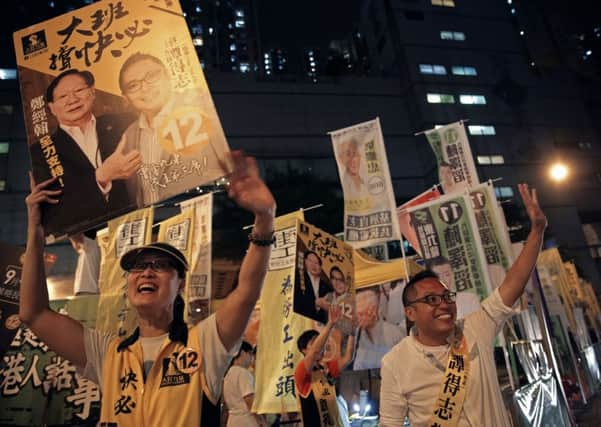Pro-democracy candidates ride tide of anti-China sentiment


The vote for Legislative Council lawmakers is set to test the unity of Hong Kong’s pro-democracy camp as a new generation of radical activists, who emerged in the wake of 2014 pro-democracy street protests, joined the race.
They’re hoping to ride a rising tide of anti-China sentiment as they challenge formidably resourced pro-Beijing rivals. Many of the newcomers back the previously unthinkable idea of independence for Hong Kong, which has added to divisions with the broader pro-democracy movement and overshadowed the election.
Advertisement
Hide AdAdvertisement
Hide AdLast month, officials disqualified six pro-independence candidates in an attempt to tamp down the debate, though other candidates with similar views made the cut.
Hong Kong voters feel they have few other negotiating tactics left in their battle for genuine democracy as Beijing takes an increasingly hard-line stance.
“It’s bleak, but I think if China doesn’t leave us to do what we want, I think the only way is to fight for independence,” said Aron Yuen, a 34-year-old college lecturer, as he stood in line of about 100 other people to cast their ballots.
“You can’t negotiate with somebody who doesn’t keep their promise,” said Yuen. He planned to vote for the 23-year-old Nathan Law who, along with teen activist Joshua Wong, played a key role leading the 2014 protests. Their party, Demosisto, advocates a referendum on “self-determination” of Hong Kong’s future.
At stake is the power to keep the city’s unpopular Beijing-backed leader, Leung Chun-ying, and his government in check. “Pan-democrat” lawmakers currently control 27 of 70 seats, compared with 43 held by lawmakers friendly to Beijing. The democrats are fighting to keep control of at least a third of the seats, which gives them veto power to block government attempts to enact unpopular legislation, such as Beijing’s controversial election revamp that triggered the 2014 street protests.